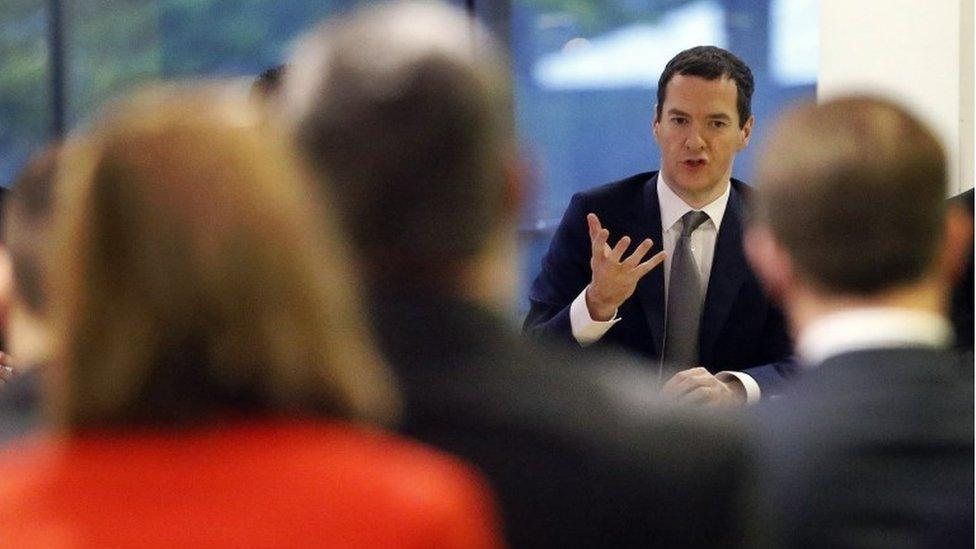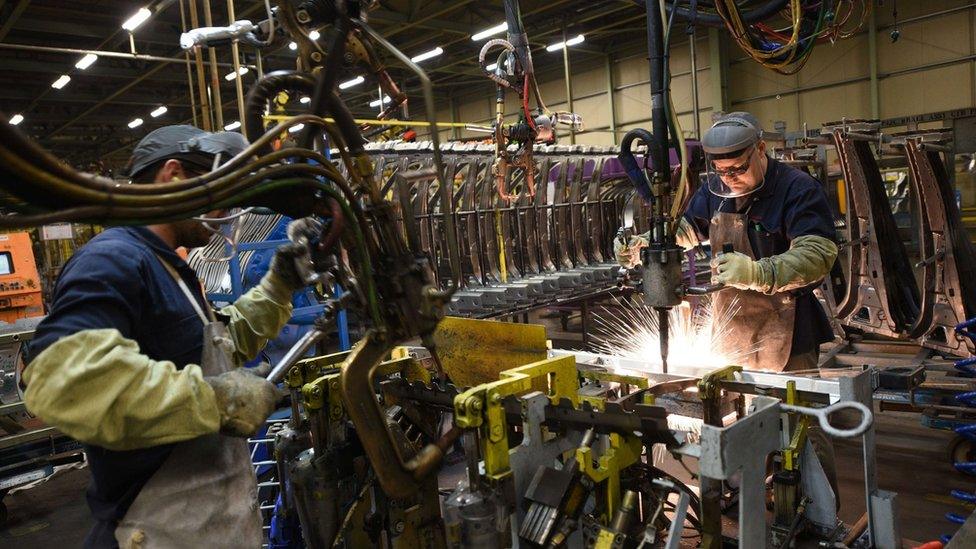George Osborne warns of 'dangerous cocktail' of economic risks
- Published
- comments

George Osborne has re-found his gloomy boots. After a relatively positive Autumn Statement, in which the Chancellor said that the UK was "growing fast", Mr Osborne will today lay out a litany of risks the UK economy faces over the next 12 months.
And a Happy New Year to you all, you can almost hear him saying.
Tensions in the Middle East, slowing growth in China, low prices for commodities such as oil and copper are all weighing on global confidence, he will say in a speech.
On the domestic front, the first interest rate rise since 2007 could come this year.
Treasury sources point out that is not a decision for the Chancellor - interest rate rises are a matter for the Bank of England - but there are many home owners with large mortgages who have never experienced even a small rate rise.
Privately, those close to Mr Osborne express concern that a rate rise could damage consumer confidence.
Even though, they argue, it would signal a UK economy returning to some semblance of normality.
It is a delicate area, and late last night this section of the speech was still being worked on.
The Chancellor wants to raise the issue, but be careful to strike the right tone.

Political developments in the Middle East concern us all, the chancellor says
"Anyone who thinks it's mission accomplished with the British economy is making a grave mistake," the Chancellor is expected to say in the speech later today in Cardiff.
"Last year was the worst for global growth since the [financial] crash and this year opens with a dangerous cocktail of new threats.
"I worry about a creeping complacency in the national debate about our economy.
"A sense that the hard work at home is complete and that we're immune from the risks abroad. A sense we can let up, and the good economic news will just keep rolling in.
"We are only seven days into the New Year, and already we've had worrying news about stock market falls around the world, the slowdown in China, deep problems in Brazil and in Russia.
"Commodity prices have fallen very significantly. Oil, which was over $120 a barrel in 2012, now stands at less than $40.
"That is good for consumers and business customers here in Britain, bad news for the oil and gas industry, worrying for the creditors who have lent to it, and a massive problem for the countries that depend on it.
"Meanwhile the political developments in the Middle East, with Saudi Arabia and Iran, concern us all."
'Two tier'
The Chancellor's stark words come on the same day the British Chambers of Commerce releases its quarterly economic survey which gives a pretty mixed assessment of business confidence in the UK economy.
The evidence most likely to worry Mr Osborne from the survey of over 7,000 firms is that Britain is in danger of becoming a "two tier" economy.
The services sector, which includes retail, banking and tourism, is performing well, although confidence about growth in 2016 has dipped.
In manufacturing - key to the Chancellor's efforts to "re-balance" the economy - the outlook is gloomier.
The BCC survey suggests that confidence among manufacturing businesses is below the pre-recession levels of 2007 and that the sector is stagnating.
'Chafed'
Mr Osborne likes to speak of the "march of the makers". Some might say it is more of a slow shuffle.
"It is not enough to rely upon consumer spending and the housing market to grow the economy, nor to rely purely on services to drive export growth. We need a rebalanced economy," John Longworth, director general of the BCC, said.
"In addition, government policy [on the living wage] has created overwhelming pressure to increase pay settlements, despite downward pressure on wages created by continued migration to the UK.
"Businesses are finding themselves chafed and stagnating."
On Wednesday, a National Audit Office report, external revealed the risks facing the UK's major infrastructure projects such as road and rail developments, the delivery of which is a key component of economic prosperity.
Over a third were at risk or "unachievable" if remedial action is not taken.
The Government may make big promises.
Delivering them is more problematic.
Worrying voters
Of course, there is a political edge to Mr Osborne's speech.
The Chancellor knows very well that if people are concerned about the economy, polls suggest they tend to turn towards the Conservatives as the "security" option.
So, worrying voters, Mr Osborne believes, is not always bad for his party.
I am told that there will be some "sunny uplands" elements to the speech, with the Chancellor saying that growth in the UK has been better than "almost anyone dared hope".
But, with his gloomy boots on, the Chancellor is tramping pretty familiar territory.

UK manufacturing growth has slowed, according to economic surveys